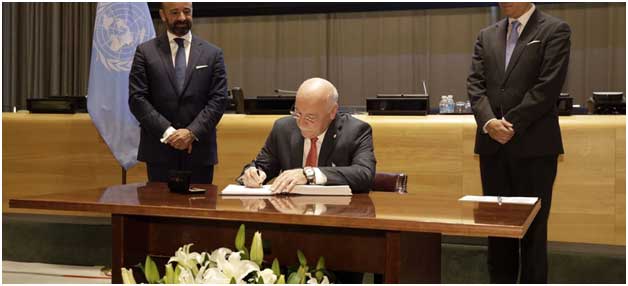Armed Conflicts, Civil Society, Featured, Global, Global Geopolitics, Global Governance, Headlines, IPS UN: Inside the Glasshouse, Nuclear Energy – Nuclear Weapons, Peace, TerraViva United Nations

An increasing number of New Yorkers appear to have started wearing face masks as a precaution against the coronavirus. The city recorded its first case 1 March. Credit: UN Photo/Loey Felipe
– First, it was the ill-fated annual sessions of the UN Commission on the Status of Women (CSW), scheduled for March 9-20, which was undermined by the spreading coronavirus COVID-19.
Now comes a second potential casualty—the upcoming month-long (27 April-22 May) Review Conference of the Treaty on Non-Proliferation of Nuclear Weapons (NPT) which may be upstaged by the deadly virus.
The landmark treaty— which represents the only binding multilateral commitment to the goal of disarmament by the world’s nuclear-weapon States—would also mark its 50th anniversary this year.
But a lingering question remains: will the Review Conference be either postponed, cancelled or held under restrictive conditions–even as the Trump administration plans to deny entry visas to visitors, and by extension delegates, from heavily-infected countries, including China, Japan, South Korea, Iran, Italy and the Philippines, among others.
The 10-day CSW meeting, one of the key annual gatherings of women, was shrunk to a one-day event, scheduled for March 9 — because of the fast-spreading coronavirus—which would have shut off most of the approximately 8,000-9,000 participants from overseas.
“The 50-year old NPT is threatening the world with an even worse illness than the new terrifying coronavirus,” one anti-nuclear activist warned.
According to the United Nations, the Treaty, particularly article VIII, paragraph 3, envisages a review of the operation of the Treaty every five years, a provision which was reaffirmed by the States parties at the 1995 NPT Review and Extension Conference and the 2000 NPT Review Conference.
John Burroughs, Executive Director, Lawyers Committee on Nuclear Policy, New York City, told IPS that aside from whether protection of health warrants a postponement of the Review Conference, delay could be good for the non-proliferation/disarmament regime.
Right now, the United States, Russia, and China have nothing to offer in the way of nuclear arms reductions, actual or prospective, he argued.

Signing ceremony at UN Headquarters in New York for the Treaty on the Prohibition of Nuclear Weapons, 20 September 2017. Credit: UN Photo/Paulo Filgueiras
“This is despite the commitments they made, along with the United Kingdom and France, at the 2010 Review Conference, “to undertake further efforts to reduce and ultimately eliminate all types of nuclear weapons”.
The failure to fulfill this and other commitments made at the 1995, 2000, and 2010 conferences is the single most important factor casting a pall over the upcoming conference and making a consensus substantive outcome unlikely, warned Burroughs.
Dr Rebecca Johnson, Director, Acronym Institute for Disarmament and Diplomacy, who has reported on every NPT meeting since 1994, told IPS “the COVID-19 coronavirus spreads quickly, so on grounds of public health, we all need to limit physical meetings and travel.”
“On those grounds, I think it would probably be prudent to postpone the NPT Review Conference to a time when we have a clearer idea of the COVID-19 impacts and there is greater capacity to deal with it’.
If this is to be their decision, she noted, the UN and NPT states need to make it sooner rather than later, as a lot of people — myself included — have already booked travel and accommodation in New York.
“I would not support any proposals to “limit” the NPT Review Conference as this would likely be used to restrict the full participation of civil society and many delegations who do not have their nuclear experts based in New York”.
Dr Johnson said the postponement of the Review Conference to 2021 should not be a political problem for the NPT and non-proliferation regime, and may even turn out to be advantageous for the health of the NPT.
“This year, there are deep concerns that toxic political relations between several nuclear-armed or significant NPT States Parties will cause the NPT Review Conference to fail, the third time since 2015. There may be better prospects for a positive NPT outcome in 2021, though of course nothing is certain in life or politics!”
She added: “If held in 2021, it would be sensible to choose the most practical NPT-related city, whether Vienna, Geneva or New York.”
Burroughs said it is conceivable that the picture will be better by the end of 2020. He said Reuters reports that on February 28, a senior US administration official said that President Trump is willing to hold a summit of the five NPT nuclear weapon states to discuss arms control.
“While China maintains that it will not join trilateral arms control negotiations due to the vast disparity between its nuclear forces and those of the United States and Russia, it has said that it would discuss “strategic security” issues in a five-power format”.
China’s position that it will not engage in arms controls talks should be challenged. Negotiators can be creative, he said.
One can imagine, for example, addressing intermediate- and short-range missiles, most conventionally armed, fielded in its region by China, as well as US and Russian actual and planned deployments of such missiles, Burroughs said.
“Or China’s long-range nuclear forces could be capped while US and Russian reductions proceed. More ambitiously, the five NPT nuclear weapon states could launch negotiations on global elimination of nuclear arsenals and invite non-NPT nuclear-armed states and perhaps other states to join”.
The five NPT nuclear weapons states are the US, UK, China, Russia and France – all veto-wielding permanent members of the UN Security Council– while the four non-NPT nuclear armed states are India, Pakistan, Israel and North Korea.
https://www.reuters.com/article/us-usa-trump-russia-summit-idUSKCN20M3CJ
https://www.fmprc.gov.cn/mfa_eng/wjbxw/t1746174.shtml
Dr M. V. Ramana, Professor and Simons Chair in Disarmament, Global and Human Security, and Director, Liu Institute for Global Issues, at the School of Public Policy and Global Affairs, University of British Columbia, told IPS “I think there is a good case to postpone the Review Conference”.
“At this point, we don’t know how the coronavirus infections will spread — and bringing together a large number of people from different countries to one building definitely contributes a level of risk”.
Further, he said, there will be the additional uncertainty imposed by the Trump administration’s plans to block people from various countries with high levels of infections. Some of those countries, China and Iran, are central to the future of the NPT.
The writer can be contacted at thalifdeen@aol.com
